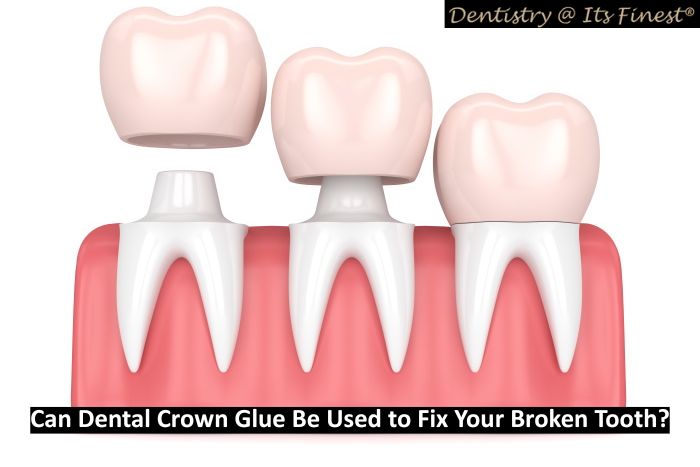Dental crown glue, also called dental crown cement or dental crown adhesive, is a specialized material used to secure restorations such as crowns, bridges, inlays, onlays, or implants to natural teeth. It works by filling the gap between the crown and tooth, hardening into a strong seal that prevents bacteria from entering and protects the tooth from further damage. The best dental crown glue overall is resin-based cement, since it creates a durable chemical bond, resists saliva and microleakage, and provides long-term stability. While dental crown glue can sometimes be used to cover or protect a chipped or broken tooth as a temporary measure, it is not a permanent fix. Only a dentist can properly restore a broken tooth with the right materials and treatment.
Can I Use Dental Crown Glue to Fix My Broken Tooth?
No. Dental crown repair cement or dental glue to fix crown only works as a short-term patch. It holds the crown in place for a day or two and eases sensitivity, but it lacks the strength and seal of professional materials.Dentists use stronger bonding cements that protect the tooth and prevent decay. Glue to fix dental crown at home should only be used in an emergency until you see your dentist for proper treatment.
What is a Dental Crown Glue?
Dental crown glue, also called dental cement, tooth glue, or tooth crown glue, is used by dentists to secure restorations such as crowns, bridges, inlays, onlays, or implants to natural teeth. Over-the-counter versions are available, but these are only intended for very short-term fixes until professional care is provided.
What Kind of Glue to Use on a Dental Crown?
Among the different dental crown cement types, glass ionomer cement is widely used because it bonds well with metal alloys and stainless steel restorations. Made from glass particles and polyacrylic acid, it is strong, durable, and suitable for crowns, bridges, posts, and inlays. It is used with porcelain restorations and offers similar strength to zinc phosphate cement.
Dental Glue for Loose Crown
The best option for a loose crown is temporary dental cement. Available at most pharmacies, it allows you to reposition the crown and protect the tooth until you see your dentist for a permanent solution.
Dental Implant Crown Glue
For implant-supported crowns, only a dentist should apply the correct cement. Resin-based or resin‑modified glass ionomer cements are typically used for long-term stability. Over-the-counter products or dental putty are not suitable for implant crowns.
Temporary Dental Crown Glue
The ideal material for reattaching a temporary crown is temporary dental crown cement, which is purchased at a pharmacy. Apply it inside the crown and place it back over the tooth as directed. If dental cement is not available, toothpaste or petroleum jelly may serve as a very short-term substitute.
Permanent Dental Crown Glue
The most reliable permanent dental crown adhesive is zinc phosphate, trusted for decades due to its strength and durability. Other options include glass ionomer (GI) and resin‑modified glass ionomer (RMGI), which combine strength with fluoride release and ease of use.
What is the Best Dental Cement for Crown?
The best dental crown cement overall is zinc phosphate. Known as the original crown adhesive, it provides high compressive strength, good film thickness, and strong tensile properties, making it a dependable choice for crowns, inlays, onlays, orthodontic appliances, and partial dentures.
Now that you know the main types of dental crown glue for different situations, you can better understand which option is best for temporary fixes at home and which require professional application for long-term success.
How to Glue a Dental Crown Back On
For a temporary fix, use dental cement from a pharmacy. Apply it inside the crown and place it back over the tooth following the product instructions. If dental cement is unavailable, toothpaste or petroleum jelly is used briefly, but only until you see your dentist.
How to Remove Dental Cement from Crown at Home?
Excess dental cement around a crown is sometimes gently cleaned with warm saltwater rinses, soft brushing, or careful flossing, but full removal of hardened cement should be done by a dentist to avoid damaging the crown or tooth.
How Long for Dental Crown Cement to Set?
Most dental crown cements set within 10 to 15 minutes, but they continue to fully cure and reach maximum strength over 24 to 48 hours, which is why dentists recommend avoiding sticky or hard foods during that period.

